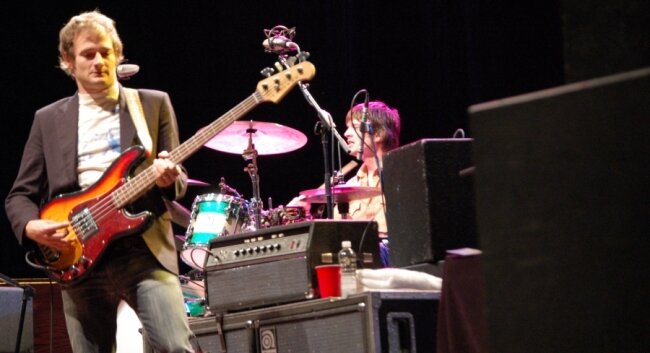Exterior outlets: Stirratt explains why Wilco rocks on
Over the past couple decades, few bands have been as consistently successful as Wilco, who have managed without a steady lineup or even a regular sound. Starting off as an alt-country act, Wilco changed into an experimental rock band and swapped members almost as frequently as aesthetics (with multi-instrumentalist Jay Bennett's 2002 departure discussed almost as much as that year's landmark album Yankee Hotel Foxtrot). As the roster slowly settled, the band moved away from experiments for a while, but last year released one of its most challenging records, The Whole Love.
Bassist John Stirratt (along with Jeff Tweedy, one of only two remaining founders) acknowledges that the recent stability has been fruitful.
“What Nels [Cline, guitarist] and everyone can do in terms of atmosphere is sort of endless,” says Stirratt. “Almost any sort of weird sound could be organically generated. It's amazing, but it's also sort of intimidating.”
In The Whole Love, this "wider" possibility becomes guitar freakouts and extended folk numbers, punk attacks, and country tones. The disc's scattered styles stay sonically unified, feeling like the natural output of a band that's comfortable with itself but unwilling to stay so.
“Within the band, there's a restlessness," says Stirratt. "You don't want to make the same album twice."
This album stems more from studio work than a relaxed album like Sky Blue Sky, and these songs became a "journey" throughout the recording process. “Sunloathe," for instance, features Cline on four types of guitars, and his bandmates add an assortment of keys, synths, and even a glockenspiel.
“'Art of Almost,'" explains Stirratt about the tense opener, "started out as almost a soul jam." Stirratt says orchestration, such as the strings on “Black Moon,” emerged under the influence of co-producer and multi-instrumentalist Pat Sansone's influence– "a very attentive, detail-oriented person in the studio."
Making an ambitious, varied album could have felt unsafe, but Stirratt says, “I guess we've made risky records that were more of a departure from the previous record before.” This album, though, was the first one for Wilco's own label dBpm, which provided the band some extra incentive to put out something good. But as Stirratt points out, “In the past, we've been rewarded for taking risks.”
Wilco's experiments on Yankee Hotel Foxtrot and resulting label drop and re-signing has been well documented, but the band's had plenty of artistic freedom.
“For years, Warner didn't really care enough about us to really stick their nose in," laughs Stirratt. "Moving on to Nonesuch after that, we were looking for creative freedom, and we found it.” So has Stirratt.
“I'm working in collaboration with the rest of the members on Jeff's tunes," he says. "I was more of a solo songwriter on the first album," he explains, "but Jeff had been in a collaboration for so long at that point, he had so many songs, and he was looking for a platform for his material.”
One of the keys to Wilco's current stability may be knowing that the band that plays apart stays together, and each of Wilco's artists have other musical outlets, such as Stirratt and Sansone's the Autumn Defense.
“I don't really understand how a band stays together without any sort of exterior [outlet]," he says "It's important to see how other people play, so the thing doesn't feel so hermetic. It keeps us sharp, even if I'm not playing bass.”
Maybe for that reason the group seems as united in its variance as ever.

1 comment
Nice article. Looking forward to the Wilco show on the 19th! I saw Tweedy play at Trax with Uncle Tupelo on the Anodyne tour, and with Wilco right after A.M. was released. Tweedy's sell out solo show at the Paramount was a testimony to the caliber of singer/songwriter that he is. Welcome back to C'vlle Wilco! This is a show not to be missed.